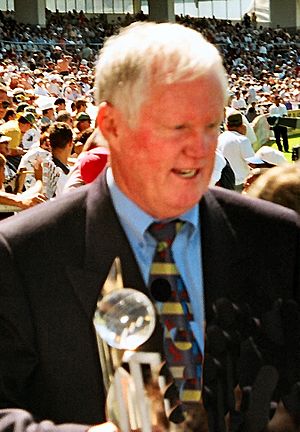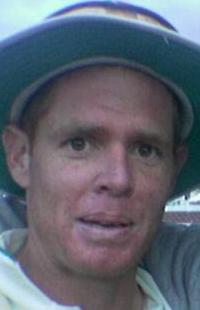Graeme Pollock facts for kids

Pollock in 2000
|
|||||||||||||||||||||||||||||||||||||||||||||||||||||
| Personal information | |||||||||||||||||||||||||||||||||||||||||||||||||||||
|---|---|---|---|---|---|---|---|---|---|---|---|---|---|---|---|---|---|---|---|---|---|---|---|---|---|---|---|---|---|---|---|---|---|---|---|---|---|---|---|---|---|---|---|---|---|---|---|---|---|---|---|---|---|
| Full name |
Robert Graeme Pollock
|
||||||||||||||||||||||||||||||||||||||||||||||||||||
| Born | 27 February 1944 Durban, Natal Province, Union of South Africa |
||||||||||||||||||||||||||||||||||||||||||||||||||||
| Nickname | Little Dog | ||||||||||||||||||||||||||||||||||||||||||||||||||||
| Height | 6 ft 2 in (188 cm) | ||||||||||||||||||||||||||||||||||||||||||||||||||||
| Batting | Left-handed | ||||||||||||||||||||||||||||||||||||||||||||||||||||
| Bowling | Leg break | ||||||||||||||||||||||||||||||||||||||||||||||||||||
| Role | Batsman | ||||||||||||||||||||||||||||||||||||||||||||||||||||
| Relations | Andrew Maclean Pollock (father) Robert Howden (uncle) Peter Pollock (brother) Ravenor Nicholson (cousin) Christopher Robert Nicholson (cousin) Andrew Graeme Pollock (son) Anthony Pollock (son) Shaun Pollock (nephew) |
||||||||||||||||||||||||||||||||||||||||||||||||||||
| International information | |||||||||||||||||||||||||||||||||||||||||||||||||||||
| National side | |||||||||||||||||||||||||||||||||||||||||||||||||||||
| Test debut (cap 218) | 6 December 1963 v Australia | ||||||||||||||||||||||||||||||||||||||||||||||||||||
| Last Test | 5 March 1970 v Australia | ||||||||||||||||||||||||||||||||||||||||||||||||||||
| Domestic team information | |||||||||||||||||||||||||||||||||||||||||||||||||||||
| Years | Team | ||||||||||||||||||||||||||||||||||||||||||||||||||||
| 1960/61–1977/78 | Eastern Province | ||||||||||||||||||||||||||||||||||||||||||||||||||||
| 1978/79–1986/87 | Transvaal | ||||||||||||||||||||||||||||||||||||||||||||||||||||
| Career statistics | |||||||||||||||||||||||||||||||||||||||||||||||||||||
|
|||||||||||||||||||||||||||||||||||||||||||||||||||||
|
Source: CricketArchive, 4 November 2008
|
|||||||||||||||||||||||||||||||||||||||||||||||||||||
Robert Graeme Pollock (born 27 February 1944) is a famous former cricketer from South Africa. He played for the national team, Transvaal, and Eastern Province. Many people think Pollock is one of South Africa's best cricketers ever. He is also seen as one of the greatest batsmen in cricket history.
Pollock's international career ended when he was only 26 years old. This happened because of a sports ban against South Africa. Even so, he set many records. He played 23 Test matches, mostly against England and Australia. His Test match batting average of 60.97 is still one of the best ever. Only Sir Don Bradman and Adam Voges have a higher average.
Graeme Pollock has received many awards. In 1999, he was voted South Africa's Cricketer of the 20th Century. He was also named one of Wisden's Cricketers of the Year in 1966. Later, in 2007, he was chosen as the Wisden Leading Cricketer in the World for 1967 and 1969. In South Africa, he was player of the year in 1961 and 1984. Don Bradman, a legendary cricketer, said Pollock was one of the best left-handed batsmen he had ever seen. In 2009, Pollock joined the ICC Cricket Hall of Fame.
Contents
Early Life and Cricket Beginnings
Graeme Pollock was born in Durban, Natal Province, Union of South Africa on 27 February 1944. His family had Scottish roots. His grandfather was a minister. His father, Andrew, also played first-class cricket. He was also the editor of a newspaper.
How Pollock Got His Nickname
As a young boy, Pollock got the nickname Little Dog. This is how it happened:
His brother Peter, whose voice was still changing, made funny sounds when appealing for l.b.w.. A funny cricketer, Springbok Atholl McKinnon, said it sounded like a dog barking. He called Peter Pooch. When Graeme joined the team, they became Big Dog and Little Dog.
School Cricket and First-Class Debut
Pollock went to Grey High School in Port Elizabeth. This school was known for sports. He learned from professional cricketers there. In his first game for Grey Junior at age 9, he took all ten wickets. Then he scored 117 runs without being out. Once, he hit a six into a cemetery and had to get the ball himself! At 15, he was chosen to play for South Africa schoolboys.
In 1960, at just 16 years old, Pollock played for Eastern Province. This was his first-class cricket debut. He scored 54 runs before being run out. Later that season, he scored his first century, 102 runs. This made him the youngest South African to score a first-class century. In his first season, he scored 384 runs.
Rising Star in South African Cricket
In the 1962–63 season, Pollock scored 839 runs. He made three centuries. He scored 209 runs not out against the International Cavaliers. This team had famous bowlers like Richie Benaud. Benaud called Pollock's innings "magnificent." At 19, Pollock was the youngest South African to score a double-century in first-class cricket.
Graeme Pollock's Test Career
First Test Matches in Australia
Pollock was 19 when he went to Australia in 1963–64. He had a tough start. But in the third Test in Sydney, he scored 122 runs. He became the youngest South African to score a Test century. This record was held by him until 2025. Don Bradman praised his batting.
In the fourth Test in Adelaide, Pollock scored 175 runs. He and Eddie Barlow made a huge partnership of 341 runs. South Africa won that match. Pollock finished his first Test series with 399 runs.
Playing Against England
England toured South Africa in 1964–65. Pollock played in all five Tests. In the final Test, he scored 137 runs. Wisden Cricketers' Almanack called it a "splendid century."
In 1965, Pollock toured England with the South African team. In the Second Test, he scored 125 runs. He said this was his best innings ever. He scored his runs very quickly. Cricket writers praised his powerful and beautiful batting. His brother Peter also did well in this match, taking 10 wickets. South Africa won the series. Because of his great play, Pollock was named one of the Wisden Cricketers of the Year in 1966.
Great Success and International Ban
In 1966–67, Australia played in South Africa. Pollock scored 90 runs in the First Test. Wisden said his timing and wristwork were perfect. In the Second Test, Pollock scored 209 runs. He did this even with an injured leg. South Africa won the series three Tests to one. Pollock scored 537 runs in the series.
South Africa was supposed to play England in 1968–69. However, the tour was cancelled. This was due to South Africa's apartheid policy. A player named Basil D'Oliveira, who was of mixed race, was chosen for the England team. The South African Prime Minister, B. J. Vorster, refused to let the team enter South Africa with D'Oliveira. This led to the tour being called off.
South Africa's last Test series before being banned from international cricket was against Australia. Pollock continued his great form. He scored 274 runs in the 2nd Test in Durban. This broke the South African Test record. He held this record for almost 30 years. Pollock was only 26 years old when his Test career ended due to the ban.
Life After Official Test Cricket
Playing During Isolation
When South Africa was banned from international cricket, Pollock still played. He was part of a "Rest of the World" team that played unofficial matches against England in 1970. He scored 114 runs in one of these games.
South African cricketers felt sad about being cut off from international play. In 1971, Pollock joined a protest against the South African government's apartheid policy in cricket. During a special match, players from both teams walked off the field. They released a statement saying they supported inviting non-white players to tour Australia if they were good enough. They believed skill should be the only factor in cricket.
Pollock played in 16 unofficial Test matches against teams that visited South Africa during the ban. He ended his international career at 42 years old. He scored 144 runs against a rebel Australian team in 1987. He scored 1376 runs in these unofficial matches.
Retirement and Later Roles
Pollock kept playing first-class cricket until 1986–87, when he was 43. He scored 20,940 runs in first-class cricket. This included 64 centuries. He also played in shorter, limited-overs matches. In 1974–75, he scored 222 runs not out in a limited-overs game. This was the first double century in List A cricket.
After retiring, Pollock became involved in cricket management. He was president of the South African Cricket Players' Association. He also became a Test selector for the United Cricket Board in 2000. Later, he became a batting coach for the South African team.
In 2003, Pollock and Gary Sobers presented awards at the 2003 Cricket World Cup Final. In 2013, a pavilion at St George's Oval was named the "Graeme Pollock Pavilion" to honor him.
Graeme Pollock's Playing Style
Pollock was 6 feet 2 inches tall. He used his height well when batting. He had a strong sense of timing. He stood upright and had balanced footwork. He used a heavy bat and loved to play the cover drive. He also learned to play the pull and leg drive very well. He hit the ball with great power. He was an aggressive batsman, always looking to score runs.
Pollock does not need a half-volley or a long hop to score fours: he will drive on the up, or cut, force and pull anything even fractionally short of a good length
Besides batting, Pollock sometimes bowled leg-spin. His teammate Jackie McGlew said Pollock could have been an amazing bowler. He was also a naturally talented fielder.
Pollock's Family in Cricket

Graeme Pollock comes from a family of cricketers. His father, Andrew, played cricket. His brother, Peter Pollock, was a top fast bowler for South Africa. Both of Graeme's sons, Anthony Pollock and Andrew Graeme Pollock, played cricket. His nephew, Shaun Pollock (Peter's son), also played for South Africa. Shaun played 108 Test matches and was captain. He was South Africa's leading wicket-taker for a long time.
In 2003, Pollock shared his thoughts about the sports ban:
- He said that when he was 24, they didn't think much about people who didn't get chances. Looking back, he felt they could have done more to bring change. He knew the protesters were right that sports could help change South Africa. He said it was hard for 22 years, but it was needed. He was happy it helped bring change to South Africa.
 | George Robert Carruthers |
 | Patricia Bath |
 | Jan Ernst Matzeliger |
 | Alexander Miles |

